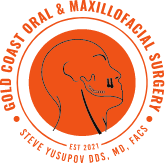Implant Dentures – Roslyn, NY
Completely Replace All Your Missing Teeth
Losing multiple teeth can make it more difficult to enjoy life to the fullest. Modern dentures can help you eat and speak properly, but they still have a few drawbacks. Fortunately, there’s another option: implant dentures that look and feel like natural teeth thanks to sturdy titanium posts placed in your jaw. At Gold Coast Oral & Maxillofacial Surgery Steve Yusupov DDS, MD, FACS, we can replace all of your missing teeth from the roots up. Call us today to learn more about implant dentures in Roslyn and whether they might be the right choice for your smile.
Why Choose Gold Coast Oral & Maxillofacial Surgery Steve Yusupov DDS, MD, FACS for Implant Dentures?
- Highly Trained Oral & Maxillofacial Surgeon
- IV Sedation Offered for Comfortable Procedures
- State of the Art Treatment Planning Technology
What Are Implant Dentures?
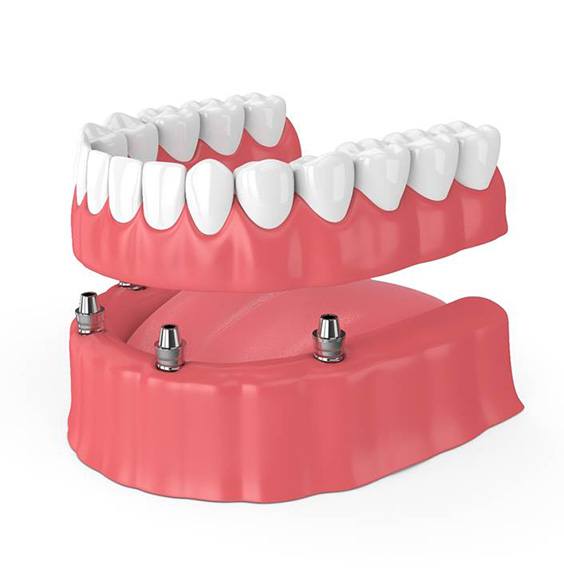
Traditional dentures either sit on your gums or are attached to your remaining natural teeth via metal clasps. Meanwhile, implant dentures are anchored to implant posts that have been surgically placed in the jawbone. What makes dental implants unique is that they can act as replacement tooth roots, allowing your new teeth to function similarly to your natural ones. Implant dentures are either fixed in place or designed to be removable depending on your needs.
Fixed/Permanent Implant Dentures
Fixed dentures are sometimes called a “hybrid prosthesis”. They will normally stay attached to your implants 24/7; they can only be removed by a trained dental expert. Many patients prefer fixed dentures since they can be brushed as if they were natural teeth. However, a certain level of jawbone density is required for this type of denture.
Removable Implant Dentures
Sometimes called “Snap-On dentures”, a removable denture is attached to implant posts via clips or ball sockets. You’ll be able to remove them as necessary, such as when you need to clean them. One of the advantages of removable implant dentures is that they require fewer implants, which often makes them a more viable option for patients with lower jawbone density.
The Implant Denture Process
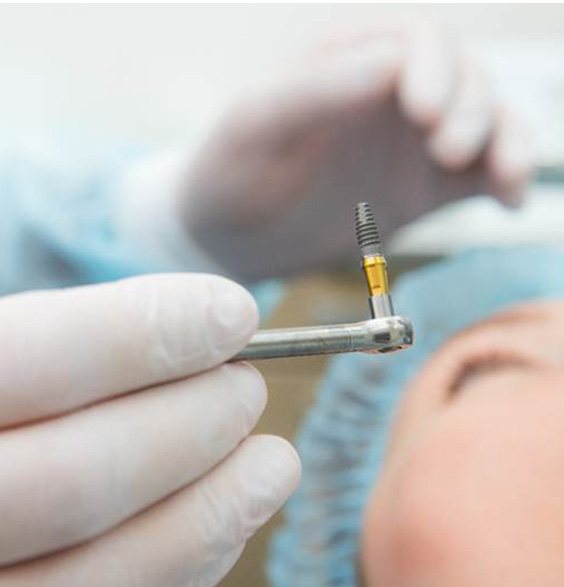
We’ll examine your mouth and take pictures of your jawbone to confirm that you’re eligible for implant surgery. Bone grafting and other preliminary treatments might be necessary depending on the state of your oral health. Once the necessary preparations have been made, the implant posts can be placed in your jaw via minor surgery.
It will take about 3 to 6 months for your implants to fuse with your jawbone. Then, an abutment will be attached to each implant post. Once the mouth has fully healed, we can take impressions to design a full or partial denture. The abutments will be used to attach your final restoration to the implant posts and complete your smile.
Am I a Candidate for Implant Dentures?
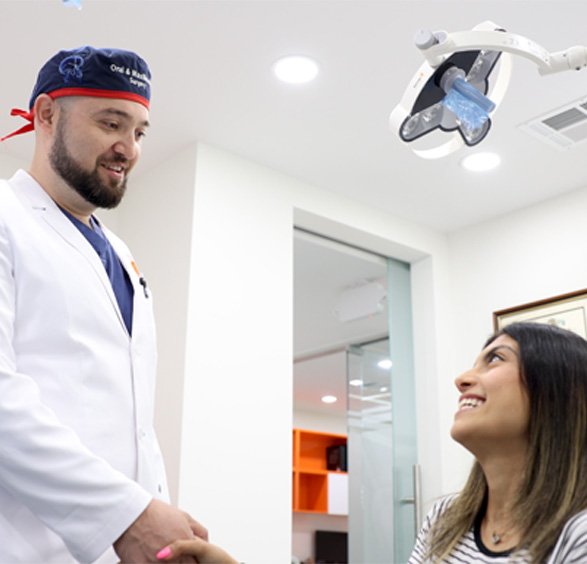
To be a good candidate for implant dentures, you need to have:
- Multiple missing teeth
- A mouth that’s free of gum disease
- Enough jawbone density for the desired type of implant denture
During your consultation, we’ll review your needs with you and help you figure out whether implant dentures are truly the best choice for restoring your smile.
Benefits of Combining Dentures & Dental Implants
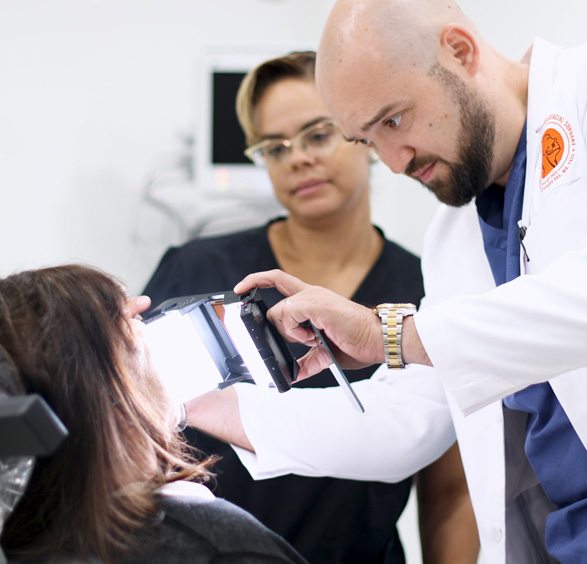
While traditional dentures can sometimes slip at awkward times, implant dentures are much more stable due to being attached to the jaw. This makes it easier to enjoy steak, corn on the cob, and a wide variety of other foods. Furthermore, dental implants directly stimulate your jaw to prevent bone loss, meaning you don’t have to worry about your dentures losing their fit over time.
Implant Dentures FAQs
What is the healing process for implant dentures?
Healing from implant denture surgery requires that you receive a healing cap that is placed on top of each implant post. Not only will your gum tissue heal around it, but it also provides the necessary room for the restoration to be positioned and placed on top.
After 4-6 months of healing and allowing osseointegration to occur (the fusing of implants to bone tissues), the abutments (connectors) can be put in place before the final restoration is added.
Although the healing process is extensive, it’s worth the wait once you discover how beautiful and long-lasting these new prosthetics can be.
Can implant dentures fail?
Yes, implant dentures can fail if you do not take proper care of them. Generally, there is a high success rate of 95% that comes with initial placement and can last 10 years; however, there are instances that can cause these permanent prosthetics to fail, such as:
- Peri-implantitis (similar to gum disease)
- Failed osseointegration because of poor lifestyle habits or implant placement
- Autoimmune and health-related conditions (i.e., diabetes, AIDS/HIV, etc.)
- Facial trauma that knocks out an implant tooth
If you believe this may be happening to you, don’t hesitate to contact our dental office right away.
How can implant dentures improve my dental health?
Placing implant dentures is not only meant to improve your smile’s aesthetics but also enhance your overall health and well-being. Your ability to eat nutrient-rich foods will reduce your risk of malnutrition and poor digestion. Your ability to speak clearly will give you greater confidence to make a speech before your boss and clients. Your ability to step out with friends and enjoy all that life has to offer is significantly easier once you have a complete smile that remains comfortable and secure.
You will notice that your mental and emotional health drastically improves when you like the way your smile looks in the mirror.
What should I do after my dental implant surgery?
Immediately following the placement of your implant dentures, you’ll need to follow the guidelines provided to you by our dental team. These include:
- Avoiding smoking or chewing any kind of tobacco. During your consultation, we will discuss ways to help you quit if you are interested in learning. The fact is that this unhealthy lifestyle habit can reduce your chances of success if you continue to smoke or use tobacco.
- Not using heat on your face but instead a cold compress. While ice brings any swelling down, heat causes more of it.
- Staying away from straws and vigorous rinsing. Doing either of these can cause your blood clots to dislodge, resulting in a dry socket.
- Avoid touching your new implants with your finger or tongue.
Oral Surgery Maxillofacial Surgery IV Anesthesia/Sedation View Our Services
